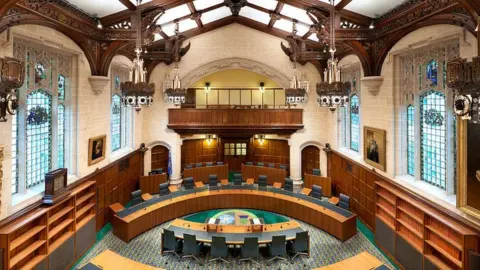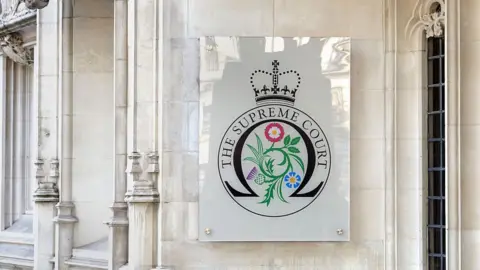Supreme Court to hear arguments on indyref2 powers
 Getty Images
Getty ImagesThe Supreme Court is to hear arguments about whether or not Holyrood could set up an independence referendum.
The Scottish government wants judges to settle whether MSPs could legislate for a vote without Westminster's backing.
But UK law officers argue this is premature, and want the case thrown out without a ruling either way.
This could still happen, but judges say they want to hear the full arguments from both sides before coming to a decision.
The two parties have until August 9 to make written submissions, with a hearing expected later in the autumn.
First Minister Nicola Sturgeon wants to hold a referendum in October 2023, and is pushing for a deal with the UK government similar to that which paved the way for the vote in 2014.
With UK ministers still opposed to this, the SNP leader also wants the Supreme Court to rule on whether Holyrood has the power to set up a ballot without Westminster's support.
The UK government's law officers lodged an initial response with the court arguing that this move was premature, and that the usual route would be for MSPs to pass a bill before the court scrutinises it.
The court has since replied to both sides saying it wants to hear substantive arguments at the same time as considering that point, asking for full written submissions to be made in the coming weeks.
Judges refused a motion from the Advocate General for Scotland - the UK government's top Scottish law officer - asking for submissions to be limited to the question of whether the court should rule on the case at all.
The order from the court noted that "it is in the interests of justice and the efficient disposal of the proceedings that the court should hear argument on both issues at a single hearing".
 Getty Images
Getty ImagesThe SNP told the National newspaper that the move was a "significant step forward".
However, this was dismissed by Roddy Dunlop QC, Dean of the Faculty of Advocates, who said the move was "merely procedural".
He said: "The point has not been decided - it has been parked, to be decided at the same time as the substantive argument. That is far from unusual, and does not involve a 'win' for either side."
Supreme Court president Lord Reed is to decide the precise timing and procedure of the case in due course.
It is expected to be heard at the court in London at some point during its "Michaelmas" term, which begins in October.


It really shouldn't be a surprise that a court wants to hear from both sides before making its mind up.
It's also not surprising that those involved are trying to spin this as a big development, and that some newspapers are pouncing on it for easy clickbait.
But the truth is that nothing much has actually happened here.
As Roddy Dunlop QC pointed out, this is normal court procedure. In fact we have actually seen this before, in an earlier phase of the exact same argument.
In a case brought by citizen campaigner Martin Keatings, the Court of Session heard substantive arguments from the UK government about Holyrood's competence, as well as about whether the case should be heard at all.
The judges ultimately agreed that case was "premature", and declined to make a ruling - although Lord Carloway teased that "it may not be too difficult to arrive at a conclusion".
When arguing these cases, lawyers will typically throw in the kitchen sink and make every argument that might have a chance of sticking with the judges. That often includes an effort to get the whole thing thrown out, no matter how cheeky.
Ultimately, it is going to be down to the judges decide - which after all, we knew all along.